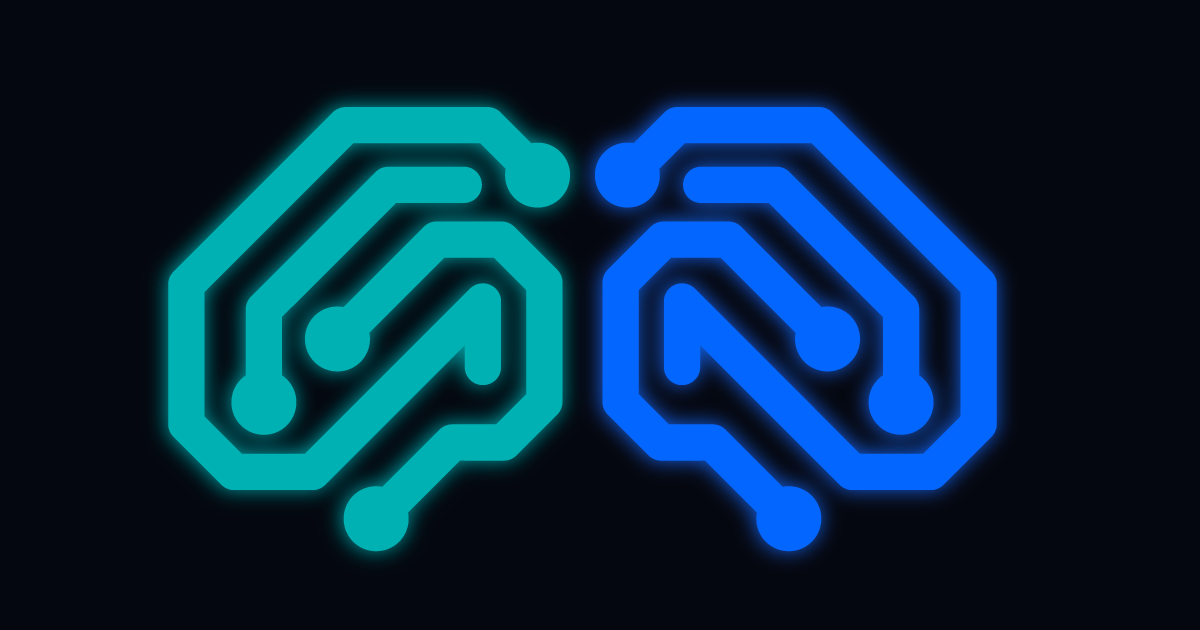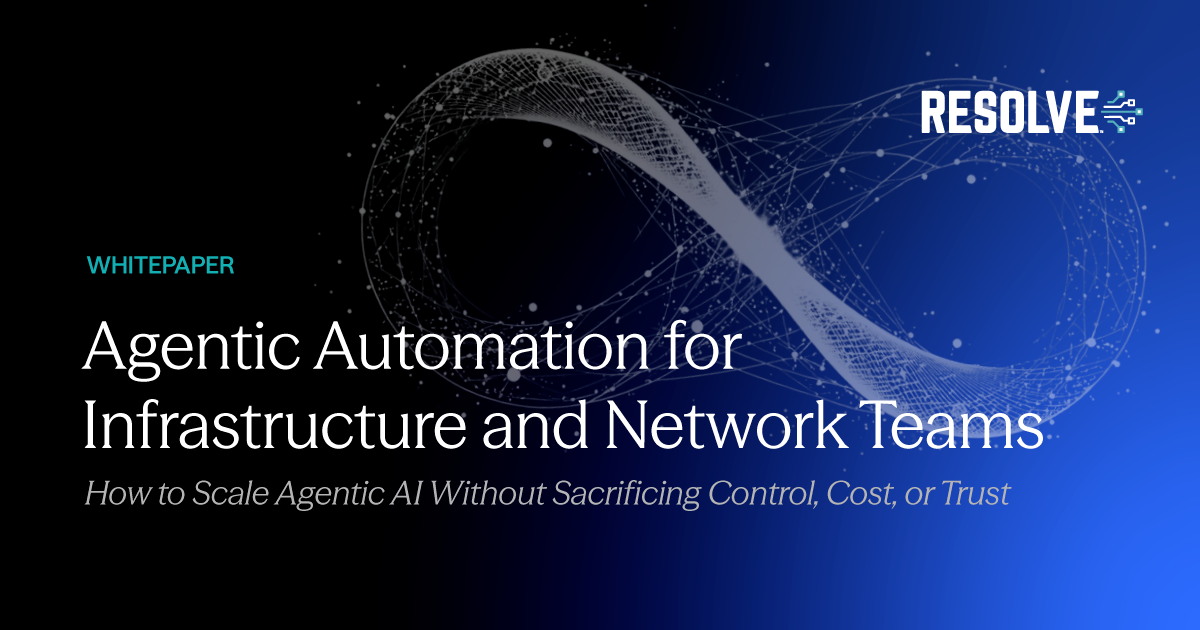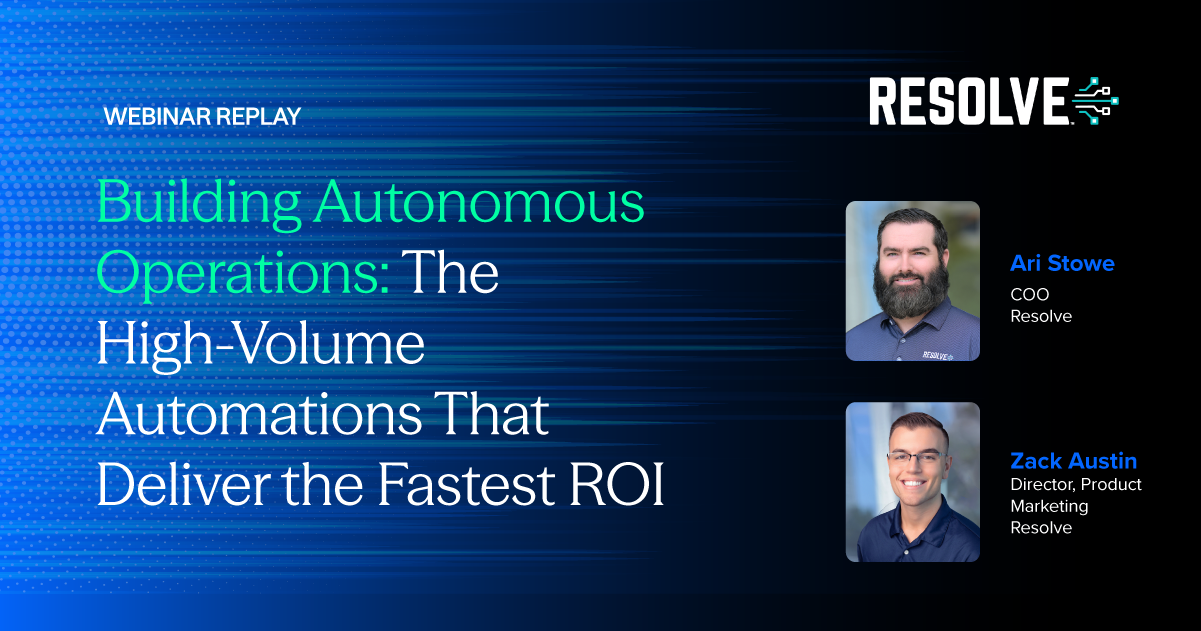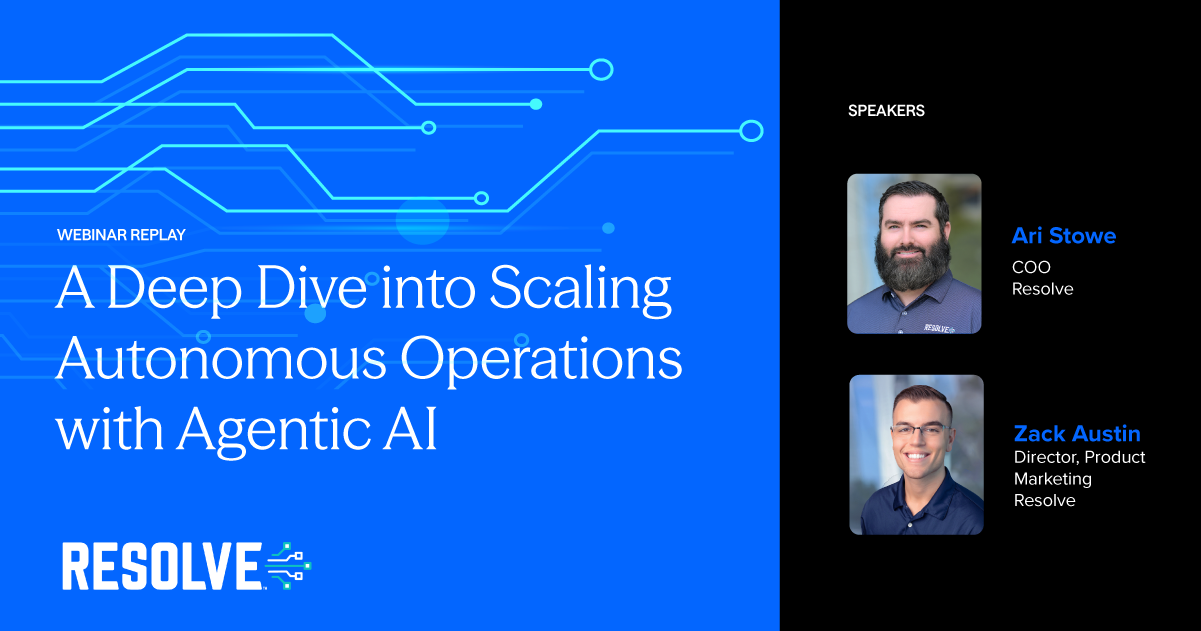
Got AI Fear? You Shouldn’t; It’s Coming for Your Busywork, Not Your Job
Subscribe to receive the latest content and invites to your inbox.
Got AI Fear? You Shouldn’t; It’s Coming for Your Busywork, Not Your Job
Artificial Intelligence (AI) has rapidly become a cornerstone of modern IT operations. Yet, despite its transformative potential, many IT professionals harbor apprehensions about integrating AI into their workflows. This growing AI fear, while understandable, often stems from misconceptions and a lack of clarity about AI's role and capabilities.
This discussion aims to address and debunk common fears associated with agentic AI. It has a crucial role as an ally in achieving Zero Ticket IT, a state in which issues are resolved automatically and IT teams are free to pursue transformative, strategic work.
1. Fear of Losing Control Over Autonomous Systems
The AI Fear
Many IT leaders feel uneasy about delegating actions to AI agents that operate independently. There's a lingering perception that once an AI system is deployed, it may behave unpredictably or “go rogue.”
Reality Check
In truth, agentic AI is not about replacing decision-makers; it’s about scaling them. Teams should architect well-defined parameters and strict policies, with built-in fail-safes that limit scope, frequency, and escalation paths. With the right implementation, AI agents become trusted collaborators, not threats.
Mitigation Strategies
- Goal Alignment: Clearly define the objectives and boundaries within which AI operates.
- Fail-Safes: Implement mechanisms that allow for human intervention when necessary.
- Transparency: Maintain clear documentation and understanding of AI decision-making processes.
By establishing these safeguards, organizations can overcome AI fear and maintain control, ensuring that AI systems act as extensions of human intent rather than independent entities.
READ MORE: 5 Use Cases Requiring Transformative AIOps Tools
2. Fear of Security Breaches and Data Privacy Issues
The AI Fear
Autonomous agents often require broad access to systems, logs, and configurations to perform their jobs effectively. That level of access raises red flags in the eyes of many human operators; what if an AI agent unintentionally exposes sensitive data or becomes an attack vector due to misconfiguration or a vulnerability?
Reality Check
Security is a legitimate concern, but it’s also one that modern agentic platforms are built to address. Trusted vendors implement enterprise-grade identity and access management (IAM) and encrypted communication protocols for every agent transaction. In many cases, AI agents reduce security risk by eliminating human error in repetitive tasks and surfacing threats faster through constant monitoring and correlation.
Best Practices
- Access Controls: Treat AI agents with the same security considerations as human users, including defined access controls and audit trails.
- Continuous Monitoring: Implement real-time monitoring to detect and respond to anomalies promptly.
- Regular Audits: Conduct periodic security assessments to identify and address potential vulnerabilities.
Addressing security proactively helps reduce AI fear while preserving data integrity and privacy.
3. Fear of AI Making Irreversible Errors
The AI Fear
What happens if an agent misfires and shuts down the wrong server? Or applies the wrong fix in production? The possibility of AI taking irreversible action keeps many teams from embracing automation, especially in high-stakes environments where uptime is critical.
Reality Check
This fear assumes AI agents operate without brakes. They don’t. Sophisticated agentic automation is built with rollback logic, staged execution, simulation environments, and escalation policies. These systems are designed to be conservative first, testing scenarios, verifying prerequisites, and executing only when safe to do so. You’re not surrendering control. You’re defining where human judgment steps in.
Preventive Measures
- Simulation Testing: Test AI actions in controlled environments before deployment.
- Controlled Environments: Implement AI in stages, starting with non-critical systems to monitor performance.
- Human-in-the-Loop Approaches: Ensure human oversight in decision-making processes, especially for high-stakes operations.
With the right safety mechanisms, the fear of AI errors becomes far less daunting.
4. Fear of Complexity and Integration Challenges
The AI Fear
Even teams excited about automation worry about the implementation burden. Will this require six months of API wiring? Will the team need to learn a new scripting language? Is it even compatible with the current tool stack?
Reality Check
Modern agentic platforms like Resolve's are built for hybrid environments. They’re API-native, vendor-agnostic, low-code, and come packaged with integrations, meaning you can build sophisticated automation without deep technical expertise. Many agentic platforms offer prebuilt blueprints for common IT and NetOps scenarios, so you can go from concept to value without a months-long learning curve.
Implementation Tips
- Pilot Projects: Start with small-scale implementations in non-critical areas to build confidence.
- Low-Code/No-Code Platforms: Leverage platforms that simplify integration and reduce the need for extensive coding.
- Training and Support: Provide adequate training and resources to teams to facilitate smooth adoption.
Taking small, informed steps helps teams move past AI fear and toward confident integration.
READ MORE: A Guide to AI for IT Operations Professionals
5. Fear of Ethical and Compliance Implications
The AI Fear
If AI is making decisions that impact users, infrastructure, or business outcomes, who’s accountable? How do you ensure fairness, transparency, and regulatory compliance, especially in industries with strict governance requirements?
Reality Check
Agentic automation doesn’t sidestep compliance; it enforces it. For example, agentic AI can flag anomalous access requests (like a finance user suddenly needing admin tools) for review before fulfillment. It can also adjust ticket handling paths based on risk scoring, ensuring that sensitive software installs trigger extra scrutiny. Ethical AI frameworks, once niche, are now standard in automation design, especially when paired with reporting that help IT leaders prove responsible operation.
Guidance
- Transparent Practices: Adopt AI systems that provide clear insights into decision-making processes.
- Regular Audits: Conduct periodic reviews to ensure AI operations align with ethical standards and regulatory requirements.
- Adherence to Standards: Follow industry best practices and guidelines to maintain compliance.
By weaving compliance into automation strategy, teams can replace AI fear with trust and accountability.
Embracing Agentic AI as a Strategic Partner
While AI fear is a natural response to emerging technologies, it can be effectively managed through informed strategies and best practices. By understanding and addressing these concerns, IT professionals can leverage AI as a powerful ally in achieving operational efficiency and the vision of Zero Ticket IT.
Embracing agentic AI doesn't mean relinquishing control; it means enhancing capabilities, improving service delivery, and positioning IT operations for future success.
Ready to explore how agentic AI can transform your IT operations?
→ Request a Demo
→ Read The Zero Ticket Future Manifesto






